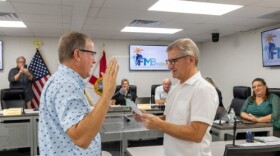A major ethics and anti-corruption bill that advocates say is long overdue - but critics say may go too far - faces a rocky path in the Florida Legislature.
The legislation seeks to end what a 2010 grand jury called a "corruption tax" on Florida citizens amounting to millions a year in extra taxes, government fees and even highway tolls to make up for the waste, fraud and misconduct by public officials.
The grand jury, sought by former Gov. Charlie Crist after a rash of public corruption cases, recommended several legal remedies, but few have been enacted.
"The state of Florida has ignored public corruption for far too long," said Ben Wilcox of the watchdog group Integrity Florida.
Efforts to move legislation forward in both the House and Senate have been mixed. Senate Bill 582, sponsored by Sen. Don Gaetz, R-Niceville, was voted down by a Senate committee last week. The House companion bill, PCB 16-05, passed its first hearing in the Rules Committee, where the Chairman Ritch Workman, R-Melbourne, is sponsor.
Many legislators favor the bill's provisions redefining corruption in criminal law to make it easier to prosecute.
Florida law currently requires prosecutors to prove that a public official or those who offer them bribes or rig bids acted corruptly or with corrupt intent - a very high hurdle, said State Attorney Phil Archer of the 18th Circuit in Brevard and Seminole Counties, who helped write the bill.
"It requires you to go into the mind of that defendant to prove their motivation," he said.
The proposed legislation would make it easier to obtain a conviction by requiring only proof that defendants acted "knowingly and intentionally."
The strongest objection to the bill appears to be that it also would apply to state contractors or vendors.
Committee member Sen. Jack Latvala, R-Clearwater, said an overzealous prosecutor could use the bill to criminalize common business practices of exchanging gifts or paying for social outings.
Latvala and others also questioned the role of a newspaper chain, USA Today Network, in originating the bill and pushing for it in legislative hearings. The chain sought out an attorney to write legislation containing the grand jury's recommendations, then published editorials seeking legislative sponsors.
Matt Reed, columnist and opinion editor for the chain's Florida papers, spoke in favor of the bill in the committee.
"We have editorialized in favor of these changes for four or five years to no effect," Reed said in response to the criticism. "We thought it was time to try something new."
The Senate committee's negative vote normally would kill the bill, but Chairman Jeremy Ring, D-Margate, who favors it, voted against it to preserve his option to move for reconsideration. Another 'no' voter, Sen. John Legg, R-New Port Richey, said believes it could be revised.
Other legislation wending its way through the committee process addresses other measures recommended by the grand jury, including:
- Giving the state Ethics Commission the power to initiate investigations. Currently, it can only act on complaints filed by citizens.
- Requiring lobbyist registration for local governments and other taxing authorities including port and expressway authorities.
- Requiring lobbyists to file monthly reports on bills they advocate or oppose.
- Tightening "revolving door" restrictions on public officials lobbying the agencies where they formerly worked.
- Requiring local government officials to file more detailed forms disclosing their financial holdings, like those state elected officials are required to file.
Copyright 2020 WUSF Public Media - WUSF 89.7. To see more, visit . 9(MDAyMTYyMTU5MDEyOTc4NzE4ODNmYWEwYQ004))








